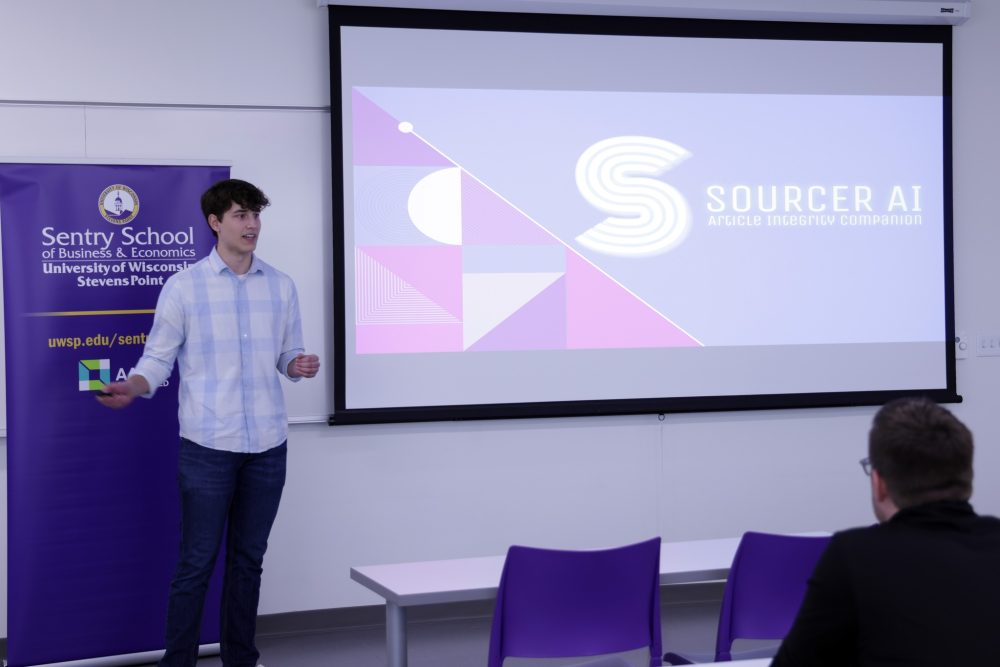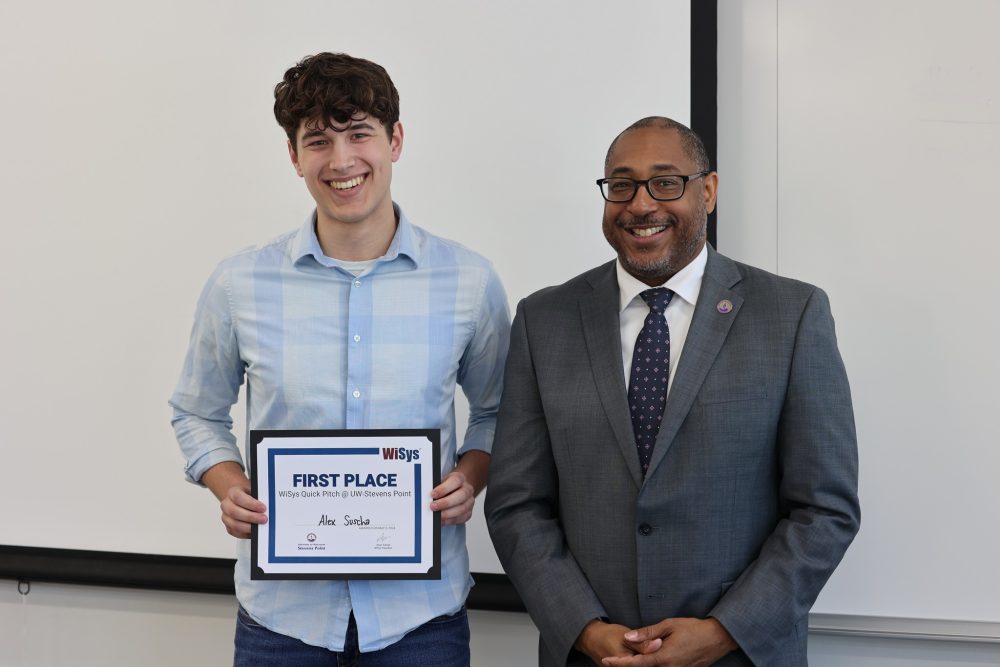As a first-year student within the Sentry School of Business and Economics at the University of Wisconsin-Stevens Point, Alex Suscha not only realized an idea for his own business, he also found the support to make it happen.
The Sheboygan native and business administration major was taking Organizational Behavior class in fall 2023 with Assistant Professor Sean Jordan when the class learned about the capabilities of artificial intelligence (AI) for business. In another class, English 150, he learned about media literacy. Putting the two concepts together sparked an idea for Suscha – how could AI be used to fact-check news articles?
One year later, Suscha’s new company, Sourcer AI, offers a tool that analyzes online media news features and articles for reputability and political bias, and offers a summary feature that condenses articles to 150 words. Articles are analyzed for being current, professional and reliable in addition to content, purpose and the source of materials.
“I felt I was the right candidate to find a solution and run this business,” Suscha said. “I have a passion to find the truth and be neutral. Years of experience in debate allow me to see both sides of any argument, as well as a need to find unbiased, impartial information.”
Suscha pitched his idea to Jordan. “He loved it and pushed me forward,” Suscha said. Jordan also connected him with Ricardo Boeing, associate professor of marketing, who had his students work on marketing plans, and Tim Krause, professor of computing and new media technologies, who helped him find student programmers. Suscha hired two, Casey Cashman, an application development major from Neenah who continues to work for him, and Ethan Cruz, who got it started before graduating.
By the end of January 2024, a working prototype was ready and was demonstrated to Patrick Gatterman, a program manager at UWSP’s Small Business Development Center, and Kevin Neuman, head of the Sentry School, who both supported his idea. Gatterman advised him at the WiSys Quick Ptich competition in May, which earned Suscha first place.
 Suscha presents his pitch, “Sourcer AI – Article Integrity Companion,” at the UW-Stevens Point WiSys Quick Pitch competition May 3.
Suscha presents his pitch, “Sourcer AI – Article Integrity Companion,” at the UW-Stevens Point WiSys Quick Pitch competition May 3.
“Working with Alex has been an incredibly rewarding experience,” said Jordan. “From the outset he showed a strong sense of curiosity and determination in exploring how AI could solve real-world sourcing challenges. He was always open to feedback and eager to iterate on his ideas. His passion for innovation, paired with his ability to quickly grasp concepts, made the mentorship process dynamic and engaging.”
Tim McKeough, a Sentry School adjunct professor and owner of Q Up Success, LLC, has also been a mentor and coach for Suscha. He currently teaches courses on sales and the entrepreneurial mindset.
“Tim has been instrumental in transforming how I approach selling by showing me the importance of conveying emotion,” Suscha said. “His guidance has elevated my ability to connect on a deeper level with my audience.”
“I believe in Alex’s ability and passion,” said McKeough. “He found a new way to tackle a common problem and is very focused on his mission of truth through innovation.”
Others in the Sentry School also offered support and connections. Reed Stratton, associate professor of business, encouraged him to join the Entrepreneurial Club and Suscha now serves as president. Matt Vollmer, an associate lecturer in business and CEO and co-founder of Arbre Technologies in Stevens Point, offered advice on creating a tech startup business and connected him with technical advisers. Suscha worked with Kit Kiefer, a lecturer in business, and student marketing group Agency 81, for help with his website, social media and marketing.
 Suscha, pictured with Chancellor Tom Gibson, earned first place at the UW-Stevens Point WiSys Quick Pitch competition.
Suscha, pictured with Chancellor Tom Gibson, earned first place at the UW-Stevens Point WiSys Quick Pitch competition.
“The Sentry School came together to help me with my idea,” Suscha said. “The people behind me really kept me going when I had challenges, I felt like I couldn’t let them down.”
Personal mentorship and experiential learning set the Sentry School apart, said Jordan.
“Students are encouraged to turn ideas into practical applications through collaboration with industry experts and hands-on projects,” he said. “The school’s focus on both academic rigor and real-world problem-solving creates a bridge that helps students like Alex not only conceive innovative ideas, but also see them through equipped with the right skills and support.”
Suscha released Sourcer AI in July using social media and the Product Hunt website, where it got more than 150 upvotes and 125 comments on the first day of release. It is currently available for a weeklong free trial, then costs $6.50 a month for 10 reputability scans, 10 bias scans and 15 summaries per day. New features and improvements are being worked on every day, said Suscha.
“Sourcer AI makes truth more accessible with innovation,” he said. “Our fast-moving culture is overwhelmed with information, so this makes it easy for people to save time while staying informed and finding accurate, factual information.”
The tool can be used as a personal resource, for research or education. Suscha hopes to promote it to teachers and professors as a tool to promote critical thinking and media literacy in the classroom. No matter what the future holds, he said he’s enjoyed the process of creating his business as it helped him grow in confidence and focus.
“UWSP helped me find my passion,” he said. “My education here has given me a path I wouldn’t have found anywhere else. I have something to share with the world and something to take into my future.”
Suscha’s advice for other students looking to start their own business is to keep your passion as an entrepreneur.
“You have to totally commit to your idea and believe that what your doing can make an impact in the world,” he said. “Put everything you have into it.
“You are the right person for your idea.”
